新概念珍藏版 lesson23
新概念英语第二册Lesson23(共5PPT)

The lesson is designed for English learners who are at an intermediate level of proficiency.
Educational Context
Plot:The lesson follows the story of a young couple, John and Jane, who are trying to start their life together after getting married.
GrammaBiblioteka parsing03Tenses
The tense of a verb indicates the time at which an action takes place, such as present, past, or future.
Voices
The voice of a verb indicates whether the action is performed by the subject or performed upon the subject. It can be active or passive voice.
Vocabulary and expression
02
词汇,指一种语言的词汇总和,包括单词、短语、习语等。
vocabulary
表达,指用语言、文字等方式将思想感情或意义传达出来。
expression
Good morning:早上好,用于日常问候。
How are you?:你好吗?用于询问对方近况。
THANKS
感谢观看
The subjunctive mood is a grammatical mood used to express wishes, hypotheses, or conditions contrary to fact. It is characterized by the use of the subjunctive form of the verb.
新概念英语第二册Lesson23(共5PPT)
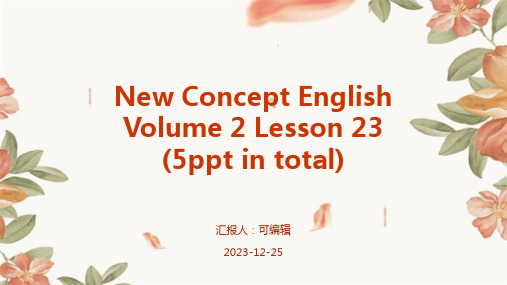
3 Reading comprehension
I learned a lot of new words and expressions in this lesson, such as "gymnastics", "trapeze", "somersault", etc. These words are very useful and enrich my vocabulary.
02
The
future
perfect
continuous tense is used to
talk about an action that
will have been completed
by a future time,
emphasizing the future
aspect.
03
Modal verbs are used to
The novel explores themes of love, nature, and redemption.
Text content
The text mainly focuses on Mary Lennox's experiences in Yorkshire and her rediscovery of nature and love.
Translation and Analysis of Texts
Sentence translation
Sentence 1
"I'm sorry, I can't make it this weekend."
Translation
"对不起,我无法参加这个周末的活动。"
新概念英语第二册第二十三课Anewhouse
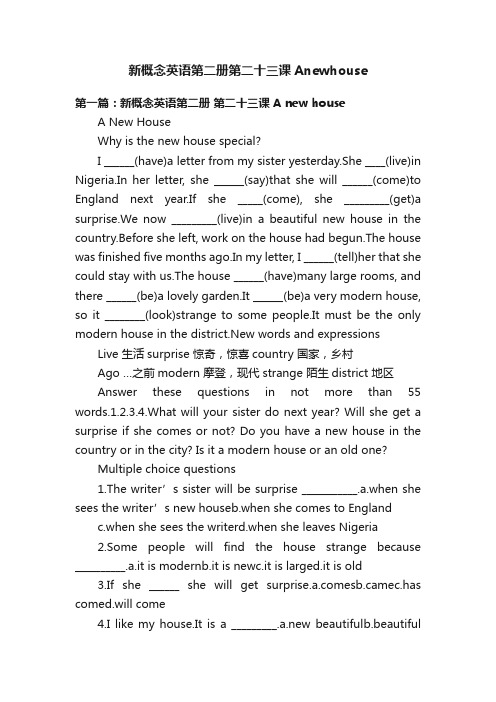
新概念英语第二册第二十三课Anewhouse第一篇:新概念英语第二册第二十三课 A new houseA New HouseWhy is the new house special?I ______(have)a letter from my sister yesterday.She ____(live)in Nigeria.In her letter, she ______(say)that she will ______(come)to England next year.If she _____(come), she _________(get)a surprise.We now _________(live)in a beautiful new house in the country.Before she left, work on the house had begun.The house was finished five months ago.In my letter, I ______(tell)her that she could stay with us.The house ______(have)many large rooms, and there ______(be)a lovely garden.It ______(be)a very modern house, so it ________(look)strange to some people.It must be the only modern house in the district.New words and expressions Live 生活surprise 惊奇,惊喜country 国家,乡村Ago …之前modern 摩登,现代strange 陌生district 地区Answer these questions in not more than 55 words.1.2.3.4.What will your sister do next year? Will she get a surprise if she comes or not? Do you have a new house in the country or in the city? Is it a modern house or an old one?Multiple choice questions1.The writer’s sister will be surprise ___________.a.when she sees the writer’s new houseb.when she comes to Englandc.when she sees the writerd.when she leaves Nigeria2.Some people will find the house strange because __________.a.it is modernb.it is newc.it is larged.it is old3.If she ______ she will get esb.camec.has comed.will come4.I like my house.It is a _________.a.new beautifulb.beautifulhouse newc.beautiful new housed.new house beautiful5.I told her that she can stay with us.That’s what I ________.a.said to herb.said herc.told to herd.told6.The house has many large rooms._________ many large rooms.a.they haveb.they arec.there haved.there are7.I had a letter yesterday.I ___________ one.a.sentb.tookc.wroted.received8.Our house is in the country.It’s not in _______.a.Nigeriab.the cityc.Englandd.France第二篇:裕兴新概念英语第二册笔记第二十六课单词学习art1)[U] 艺术,美术an art student 一个学艺术的学生 an art gallery ['ɡæləri] 画廊an art critic 艺术评论家 an art lover 艺术爱好者eg.Art is long;Life is short.(谚)艺术长久,人生短暂。
新概念英语第二册 Lesson 23课件

The bad weather made his plan a __C___ failure(失败)。
A. completed B. completing
C. complete D. completely
adj.1.奇怪的、奇异的(~r/~st) 2.陌生的、不熟悉的 [反]familiar
( ) 3. What does the new house look like?
A. large
B. modern
C. both A and B
Listen and answer the questions
1.What did the writer’s sister say in her letter?
Questions:
1.Why will the writer’s sister get a surprise when she comes to England next year?
Because the writer is living in a beautiful new house in the country.
_T__h_er_e__a__resome cards in Jim’s bag.
4. 里面还有其他的东西吗?
__Is___ t_h_e_r_e_ anything else in it?
5. 树上没有鸟。
There _a_r_e_n_’t__a_n_y__ birds in the tree.
it的用法
be strange to sb 某人不熟悉… be familiar with sb 对某人熟悉… e.g. This city is strange to me. stranger n.陌生人
新概念英语第三册第23课课文
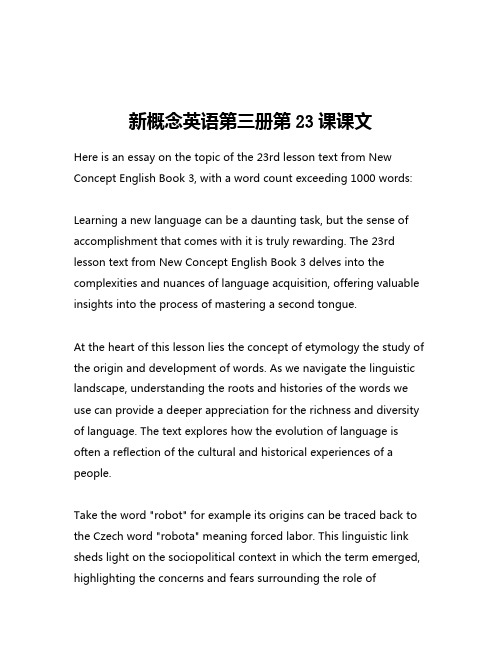
新概念英语第三册第23课课文Here is an essay on the topic of the 23rd lesson text from New Concept English Book 3, with a word count exceeding 1000 words:Learning a new language can be a daunting task, but the sense of accomplishment that comes with it is truly rewarding. The 23rd lesson text from New Concept English Book 3 delves into the complexities and nuances of language acquisition, offering valuable insights into the process of mastering a second tongue.At the heart of this lesson lies the concept of etymology the study of the origin and development of words. As we navigate the linguistic landscape, understanding the roots and histories of the words we use can provide a deeper appreciation for the richness and diversity of language. The text explores how the evolution of language is often a reflection of the cultural and historical experiences of a people.Take the word "robot" for example its origins can be traced back to the Czech word "robota" meaning forced labor. This linguistic link sheds light on the sociopolitical context in which the term emerged, highlighting the concerns and fears surrounding the role ofautomation and mechanization in society. By delving into the etymology of words, we uncover the stories and perspectives that have shaped the very fabric of our communication.Moreover, the lesson emphasizes the importance of recognizing linguistic borrowing the process by which words are adopted from one language into another. This cross-pollination of vocabularies not only enriches the linguistic tapestry but also serves as a testament to the interconnectedness of human civilizations. Words like "tsunami" from Japanese, "algebra" from Arabic, and "mafia" from Sicilian Italian all bear witness to the cultural exchange and mutual influence that have occurred throughout history.The 23rd lesson also touches upon the concept of linguistic evolution the gradual transformation of languages over time. As societies evolve, so too do their languages, adapting to changing needs, emerging technologies, and shifting cultural landscapes. The text explores how words can take on new meanings, lose their original connotations, or even fall out of use entirely. This dynamic nature of language reminds us that it is a living, breathing entity, constantly evolving to meet the demands of the modern world.One particularly fascinating aspect of the lesson is the discussion surrounding the role of standardization in language. The text delves into the efforts made by various institutions and governing bodies toestablish and maintain linguistic norms, such as the development of dictionaries and grammar guides. While these efforts aim to provide a sense of stability and consistency, the lesson also acknowledges the inherent tensions that arise between standardization and the organic evolution of language.The text recognizes that language is not a static, rigid construct but rather a fluid medium that reflects the diverse experiences and perspectives of its speakers. It highlights how the imposition of rigid linguistic standards can sometimes overlook the richness and nuance of regional dialects, minority languages, and emerging forms of expression. The lesson encourages readers to embrace the dynamism of language, recognizing that the true beauty of communication lies in its ability to adapt and evolve.Throughout the 23rd lesson, the importance of curiosity and a willingness to learn is emphasized. The text encourages readers to delve deeper into the origins and histories of the words they use, to explore the fascinating connections between languages, and to appreciate the constant evolution of linguistic landscapes. By cultivating this intellectual curiosity, the lesson suggests that we can not only improve our proficiency in a language but also develop a richer understanding of the human experience that is so inextricably linked to the way we communicate.In conclusion, the 23rd lesson text from New Concept English Book 3 offers a compelling exploration of the complexities and nuances of language. From the intriguing realm of etymology to the dynamic nature of linguistic evolution, the lesson invites readers to embark on a journey of discovery, unlocking the stories and perspectives that lie behind the words we use. By embracing this deeper understanding of language, we can not only enhance our communication skills but also gain a greater appreciation for the diverse tapestry of human expression.。
新概念英语第二册课后练习答案lesson

新概念英语第二册课后练习答案l e s s o n集团文件版本号:(M928-T898-M248-WU2669-I2896-DQ586-M1988)新概念英语第二册课后习题答案详解Lesson23练习答案 Key to written exercises1.关键句型练习答案C 1 wrote? 2 had finished? 3 breaks? 4 shall/will goD 1 told…would? 2 told…had lost? 3 said…did not like2.难点练习答案1 It?2 There?3 There?4 there?5 It6 It?7 There?8 it?9 there? 10 it3.多项选择题答案1. a根据课文第3-4行We are now living in a beautiful new house in the country. Work on it had begun before my sister left 可以判断只有a. When she sees the writer’s new house 符合课文的实际情况,其他3个选择都与课文不符。
2. a根据课文第7-8行 It is a very modern house, so it looks strange to some people, 只有a. it is modern 与课文内容相符,其他3个选择都与课文实际内容不符。
3. a这是一个条件句,if 从句应该用一般现在时,所以应该选a. comes, 其他3个选择都不是一般现在时,不符合语法。
4. ca. new beautiful house(新的,美丽的房子)虽然符合语法,但是词意思不够通顺.形容词的一般词序是品质在尺寸,新旧,颜色之前. 房子首先是新的(new house),美丽的(beautiful)应该修饰new house.?b. beautiful house new 语序不对,不合乎语法,形容词不应该放在它所修饰的名词后面;d. new house beautiful 语序不对,不合乎语法;c. beautiful new house(美丽的房子)最符合语法,词意思也最通顺,所以选c.5. c本句的主语是物the house, 而不是人,因此需要用被动语态。
新概念英语第二册Lesson23(共5PPT) (2)

CHAPTER
Grammar Focus
Definition
The past continuous tense is used to express an action that was ongoing in the past at a specific time.
Formation
The past continuous tense is formed by using the "was" or "were" of the verb "to be" with the -ing form of the main verb. For example, "He was running" or "They were playing."
Time reference
The past continuous tense is used to show an action that was happening at a particular moment in the past or during a specific period of time in the past.
The fourth slide provides examples of successful language learners and their experiences, emphasizing that anyone can learn a new language with effort and dedication.
总结词
本课中包含了许多常用的表达方式,如习语、短语、固定搭配等,学习者需要认真积累这些表达方式,以提高英语表达的准确性和流畅性。
新概念英语lesson 23

Complete adj
a. having all its parts; whole 完整的; 完全的; 全部的; 整个的
a complete collection 完善的收藏 b. thorough; in every way; total 彻底的; 全面的;
完全的
a complete stranger素不相识的人 这对我完全是件意外的事.
6. When Li Ming hurried home, he found that
his mother __D__already ____to hospital.
A has; been sent C has; sent
B had; sent D had; been sent
7. Your job ___A____ open for your return .
A few words of praise from her would have completed his happiness. (b) bring (sth) to an end; finish 使(某事物)结束; 完成 铁路何时竣工? railway
When will the railway be completed?
14. 这封信必须重写。 This letter has to be written again.
15. 我找不到我的提包。它肯定被人偷走了。 I can’t find my bag. It must have been stolen. 16. 离开房门之前,他关掉了收音机。
Before leaving the room, he turned off the radio. 17. 在完成了他的作业之后,他继续写信给他妈妈。 After finishing his homework he went on writing a letter to his parents.
新概念英语第二册Lesson-23ppt教学教材
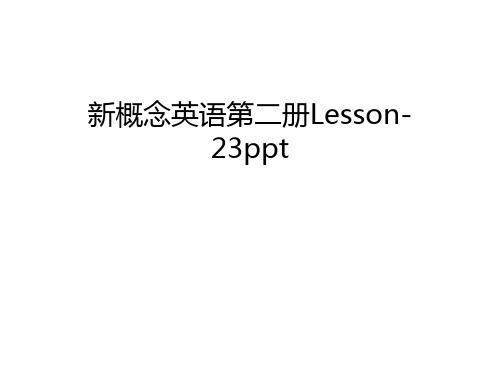
此课件下载可自行编辑修改,仅供参考! 感谢您的支持,我们努力做得更好!谢谢
新概念英语第二册Lesson23ppt
Words and expressions
❖ complete v. 完成complete building complete /finish homework complete /finish doing sth.
❖ They will complete the work in two days. adj. 完全的 完整的
❖ 他对我来说是个完完全全的陌生人 ❖ He is a complete stranger to me. ❖ Completely adv.最后噪音完全消失了 ❖ Finally, the noise disappearessions
❖ strange 奇怪的 陌生的 stranger 陌生人
❖ 他是一个奇怪的人 ❖ He is a strange person.
I am a stranger here. ❖ (口语,别人问路,你也不知道时回答) ❖ be strange to sth. 对...不习惯
Words and expressions
❖ get a surprise 感到惊喜 吃了一惊 to one‘s surprise 令某人吃惊 get a shock 感到震惊
新概念二第23课课文
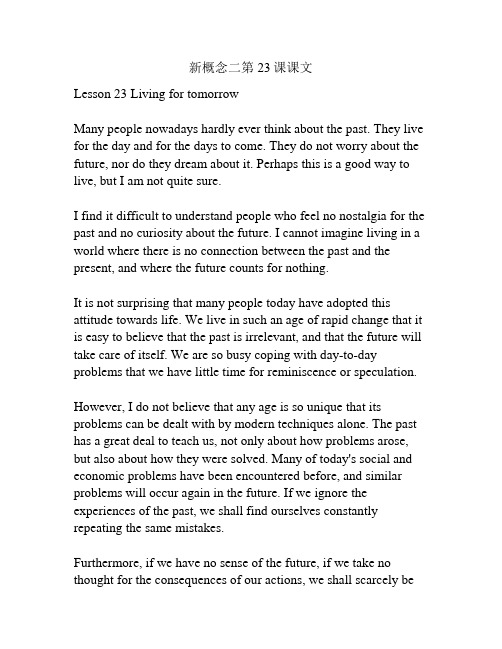
新概念二第23课课文Lesson 23 Living for tomorrowMany people nowadays hardly ever think about the past. They live for the day and for the days to come. They do not worry about the future, nor do they dream about it. Perhaps this is a good way to live, but I am not quite sure.I find it difficult to understand people who feel no nostalgia for the past and no curiosity about the future. I cannot imagine living in a world where there is no connection between the past and the present, and where the future counts for nothing.It is not surprising that many people today have adopted this attitude towards life. We live in such an age of rapid change that it is easy to believe that the past is irrelevant, and that the future will take care of itself. We are so busy coping with day-to-day problems that we have little time for reminiscence or speculation.However, I do not believe that any age is so unique that its problems can be dealt with by modern techniques alone. The past has a great deal to teach us, not only about how problems arose, but also about how they were solved. Many of today's social and economic problems have been encountered before, and similar problems will occur again in the future. If we ignore the experiences of the past, we shall find ourselves constantly repeating the same mistakes.Furthermore, if we have no sense of the future, if we take no thought for the consequences of our actions, we shall scarcely behuman. The ability to plan for tomorrow, to make provision for the future, is one of the basic characteristics of human beings. If we lose this ability, we shall lose our humanity.There is nothing wrong in living for today, provided we do not forget tomorrow. The past and the future are important, but the present is even more important. Indeed, we shall find it hard to cope with today's problems unless we take account of yesterday's mistakes and tomorrow's aspirations. We should never forget that yesterday's dreams are tomorrow's realities.。
新概念英语第二册Lesson23(共5PPT) (3)

The fifth slide concludes the lesson by summarizing the key points covered.
The fourth slide emphasizes the importance of reading and gives suggestions on how to read effectively.
PART 03
text analysis
Sentence structure analysis
总结词
掌握句子结构
详细描述
通过分析句子的主语、谓语、宾语、定语、状语等成分,以及句子的基本结构 ,帮助学生更好地理解句子的意思和功能,提高阅读理解能力。
Analysis of long and difficult sentences
Pronunciation is crucial because it affects how others perceive you and your ability to understand native speakers.
A good vocabulary allows you to express yourself more clearly and precisely in English.
Words and expressions
01
02
03
04
05
Learning English is important because it is a global language that is widely used in business, tourism, and international communication.
新概念英语第二册Lesson23(共5PPT)

In this lesson, there are several completion exercises that require students to fill in the missing words or phrases in a sentence or passage. These exercises are designed to test vocabulary, grammar, and comprehension skills. The student's ability to correctly complete the sentence or passage is then assessed.
Vocabulary and Grammar
在此添加您的文本17字
在此添加您的文本16字
在此添加您的文本16字
在此添加您的文本16字
在此添加您的文本16字
在此添加您的文本16字
Key words
1. "confidence" - a feeling of self-assurance and belief in one's abilities or qualities.
Overview of the text
The text is taken from the book "New Concept English", which is a well-known English language textbook series.
The lesson is designed to help learners improve their English language skills, including reading, writing, speaking, and listening.
新概念英语第二册 Lesson23 A new house 课件
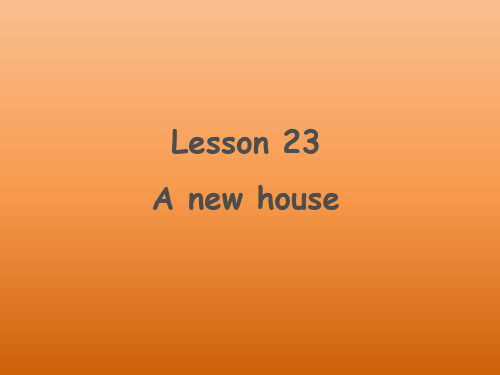
What will you do …… ?
tomorrow
next …
in two
in the
days in 2030
future
completemodern strange /k[m5pli:t/ 5mCdn//streIndV/
district /5dIstrIkt/
New words
2.They find it easy _t_o_le_a_r_n_ (learn) English. 3.You had better __g_o_ by bus, or you will be late.
(go) 4.After meal, he went on __to__d_o_his homework.
complete /k[m5pli:t/ modern /5mCdn/ strange /streIndV/ district /dIstrIkt/
v.完成 adj.新式的,与以往不同的 adj.奇怪的 n.地区
Read and Answer
Q1: When was the house completed? The house was completed ar
•It looks strange to some people. •He seems angry. •It sounds good. •This room smells terrible. •Silk feels very soft. •This coffee tastes very strong. 感官系动词: look, seem, sound, smell, feel , taste 后接形容词作表语
Words and phrases
1. have(get) a letter from sb 收到某人的来信 receive a letter from sb/hear from sb
新概念三册Lesson23

• delicacy n.美味, 佳肴
• -- He considered chicken to be a great delicacy.
• delicate adj.美味的, 可口的, 清淡的 • =delicious adj.美味的
epicure: 美食家 glutton: 贪食者
a person who eats a lot • big-eater 饭桶 • a big-mouth 多嘴多舌的人
• illogical adj. • 不合逻辑的,无章法的 • Logical adj.符合逻辑的 • 逻辑关系 • logical relation • • logical reasoning 逻辑推理
• octopus : a sea creature with 8 tentacles
Ink-fish 乌贼 octo- 8 • Octagon 八角形 • October
• 两打鸡蛋
• two dozen eggs • (这里的dozen不加s,和
hundred/thousand累似)
• Speak nineteen to the dozen • 一直说个不停
• -This old lady is nineteen to the dozen.
• fancy v.喜爱,喜欢 • fancy doing sth. • -I fancy playing the game • Super Mario. • fancy oneself • 自命不凡 • v.想象,设想(=imagine) • -Can you fancy him eating snails?
impulsively adv.
• dozen n.12个,一打(a group of twelve)
新概念英语lesson23-24(共16页)课件

New words and expressions
1 desk
[desk] n. 课桌
• 2 table
['teibəl] n. 桌子
• 3 plate
[pleit] n. 盘子
• 4 cupboard ['kʌbəd] n. 食橱
• 5 cigarette [ˌsigə'ret] n.香烟
plates on the cupboard
spoons on the table
---Give me …please. ---Which ones? These? ---No, not those.
The ones ...
cigarettes on the television
boxes on the floor
•9、阅读使人充实,会谈使人敏捷,写作与笔记使人精确……史鉴使人明智;诗歌使人巧慧2021/9/252021/9/25Saturday, September 25, 2021 •10、每一本书是一级小阶梯,我每爬上一级,就更脱离畜生而上升到人类,更接近美好生活的观念,更热爱书籍。2021/9/252021/9/252021/9/259/25/2021 7:40:07 PM •11、书是人类进步的阶梯,终生的伴侣,最诚挚的朋友。2021/9/252021/9/252021/9/25Sep-2125-Sep-21 •12、阅读一本不适合自己阅读的书,比不阅读还要坏。我们必须会这样一种本领,选择最有价值、最适合自己所需要的读物。2021/9/252021/9/252021/9/25Saturday, September 25, 2021 13、He who seize the right moment, is the right man.谁把握机遇,谁就心想事成。2021/9/252021/9/252021/9/252021/9/259/25/2021 •14、谁要是自己还没有发展培养和教育好,他就不能发展培养和教育别人。2021年9月25日星期六2021/9/252021/9/252021/9/25 •15、一个爱书的人,他必定不致缺少一个忠实的朋友,一个良好的老师,一个可爱的伴侣,一个优婉的安慰者。2021年9月2021/9/252021/9/252021/9/259/25/2021 •16、提出一个问题往往比解决一个更重要。因为解决问题也许仅是一个数学上或实验上的技能而已,而提出新的问题,却需要有创造性的想像力,而且标志着科学的真正进步。 2021/9/252021/9/25September 25, 2021 •17、看文字须大段精彩看,耸起精神,竖起筋骨,不要困,如有刀剑在后一般。就一段中须要透;击其首则尾应,击其尾则首应,方始是。不可按册子便在,掩了册子便忘。 2021/9/252021/9/252021/9/252021/9/25
新概念英语第一册第23课Lesson23课文单词知识点
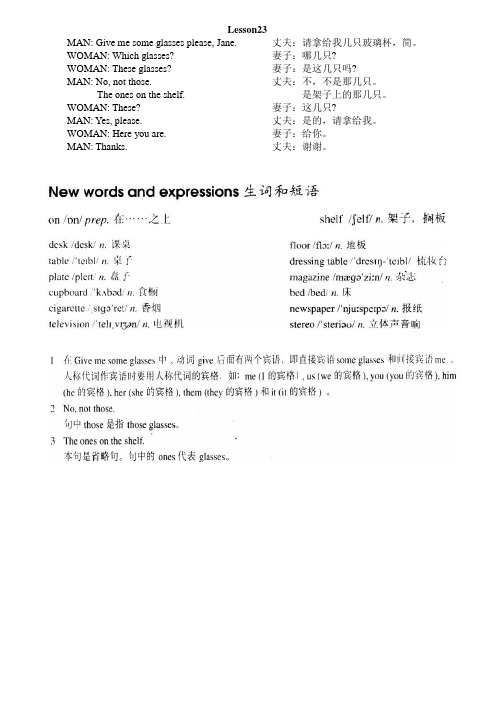
Lesson23MAN: Give me some glasses please, Jane. WOMAN: Which glasses?WOMAN: These glasses?MAN: No, not those.The ones on the shelf. WOMAN: These?MAN: Yes, please.WOMAN: Here you are.MAN: Thanks. 丈夫:请拿给我几只玻璃杯,简。
妻子:哪几只?妻子:是这几只吗?丈夫:不,不是那几只。
是架子上的那几只。
妻子:这几只?丈夫:是的,请拿给我。
妻子:给你。
丈夫:谢谢。
【知识点讲解】1. 今天来学习一个新的概念:直接宾语和间接宾语。
在课文中的"Give me some glasses"一句中有两个宾语:其中"some glasses"是直接宾语;"me"是间接宾语。
直接宾语是及物动词(give)的直接对象,也就是说这里give这个“给”的动作,给的是杯子,所以杯子就是直接宾语;而间接宾语是及物动词的动作所涉及的人或事务,也可以说间接宾语表示动作是对谁做的,或者是为谁做的。
在本句中give这个动作是对me,我做的,所以me是间接宾语。
直接宾语和间接宾语不仅仅可以用在祈使句中,在陈述句里也可以使用。
比如:He gives me a book. 他给我一本书。
其实这里的语法和我们中文是一样的。
大家应该比较容易理解。
还需要注意的是,当间接宾语是人称代词时,人称代词要用宾格。
比如me(I 的宾格)、you(you的宾格)、her(she的宾格)等等。
2. which这个疑问词,上一节课我们用到的例子中它代指的是单数"Which book?",其实它也可以代指复数,比如本课中的"Which glasses?"3. 当用one代指复数时要变成ones,比如文中的"The ones on the shelf." 另外提个小问题:shelf这个单词的动词变化,按照规则应该变成什么呢?。
新概念英语第三册lesson 23 精编课件
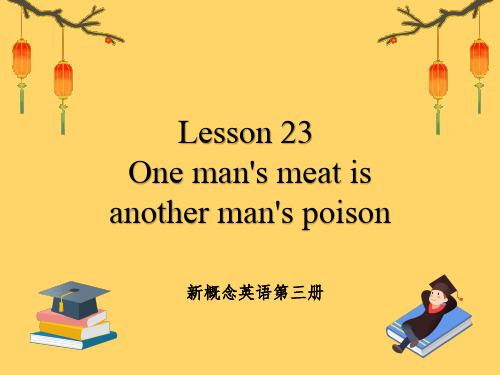
snail n.蜗牛 shower n.阵雨, 淋浴
luxury n.奢侈品, 珍品
• The diamond ring is a luxury to me. • Luxurious adj.奢侈的, 豪华的 (-- a
luxurious hotel)
associate v.联想到(connect in one’s mind)
despise v.
• We despise him for coward.(n. 胆小的人) • look down upon , 瞧不起(口语) -- Don’t look down upon any-- Eating snails never appeals to me. • Appeal v.呼吁, 上诉(appeal for sth)
力地
dozen n.12个, 一打(= a group of twelve)
• by the dozen 成打的 -- We usually buy eggs by the dozen. • dozens of… 许多的… -- Dozens of students went to the cinema. • two dozen eggs, a dozen roses(这里的dozen不加s) • a dozen of the/these roses 这些玫瑰中的一打 • speak nineteen to the dozen 一直说个不停 -- The old lady is speaking nineteen to the dozen.
stroll n.溜达, 散步(= slow walking for pleasure in street or in garden)
• go for a stroll = go for a walk, take a stroll • = take a walk • stroll v.闲逛, 漫步 -- He is strolling along the road. • Stroller n.散步者, 流浪者 • Ramble v.海岸、林中的漫步 • The couple are rambling in the forest. • Roam v.不安定的漂泊 -- The tramper roams every
- 1、下载文档前请自行甄别文档内容的完整性,平台不提供额外的编辑、内容补充、找答案等附加服务。
- 2、"仅部分预览"的文档,不可在线预览部分如存在完整性等问题,可反馈申请退款(可完整预览的文档不适用该条件!)。
- 3、如文档侵犯您的权益,请联系客服反馈,我们会尽快为您处理(人工客服工作时间:9:00-18:30)。
• • • •
今天我们的对话是和玻璃杯有关的 Listen to the story and answer the question Which glasses does the man want? The ones on the shelf.
MAN:
Text comprehension Give me some glasses please, Jane.
First thing first
• review
英语阅读理解每日练 我该喝什么呢?
• 同学们平时都喜欢喝什么饮料呢?可乐? 奶茶?热巧克力还是绿茶...走进超市我们发 现可供选择的饮料品种实在忒多啦。但是 又有多少同学知道:哪些饮料是有益健康 ,哪些饮料是有损健康的呢?一起来看看 下面的小短文吧。看完之后同学们记得认 真完成下面的习题
• desk与table • 在汉语中,这两个词都被称为“桌子”,而在英语中,它 们仍是有所区别的。 • (1)desk通常指有抽屉的桌子,用于办公、读书、写字 等,即“书桌”、“写字台”、“办公桌”: • He is working at his desk. 他正在自己的书桌前用功。 • I put it on his desk. 我把它放在他的办公桌上了。 • (2)table通常指由若干条腿支撑着的平板,没有抽屉, 即“餐桌”、“会议桌”、“工作台”、“手术台”等: • I've booked a table for two at 7.00. 我预订了一张两人桌, 是在7点钟。 • They sat round the table and made this big decision. 他们围 坐在会议桌旁,作出了这个重大的决定。
• • •
• • • • • •
语法 Grammar in use on引导的介词短语 (1)我们经常在名词、名词短语、代词或动名词前面用介词表示人 物、事件等与其他人物、事件等之间的各种关系,如空间关系、时间 关系、因果关系等。介词始终带有宾语。即使介词与宾语分开时,这 种关系仍必定存在。有许多固定的介词短语常可见到。许多介词短语 是由介词+名词(+介词)构成的, 如:on time(准时),in the middle of(在……中间)。 (2)当我们从不同的角度看空间中的位置时,应根据我们想要表达 的意思来选择介词。想表示在一个表面(即看来是平面)上面时,就 可用介词on: the pens on the desk桌上的钢笔 the boxes on the floor地板上的盒子 the bottles on the dressing table梳妆台上的瓶子 the magazines on the bed床上的杂志
relax
• 1.动词的双宾语 • 在Give me some glasses中, • 动词give后面有两个宾语,即直接宾语some glasses和间接宾语me。
• 人称代词作宾语时要用人称代词的宾格。 请参见Lessons 21~22语法部分。
• • • • • • •
2.The ones on the shelf. 是架子上的那几只。 本句是省略句,句首省略了I want。 句中的ones代表 glasses。 on the shelf是介词短语,作定语, 修饰ones。
【解析】
• 1.T.从文章第四句Coke tastes great, but it is really bad for your teeth and bones (骨骼).可以知道这句话是正确的。 2.F.从文章第五句It has a lot of sugar.“Coke含有很多糖”可 以得出答案噢。 3.F.从文章第六、第七句的Some drinks are good for us. Some are not.“一些饮料对我们有好处,一些饮料对我们有 害”可以知道这题是错误的。 4.F.从文章倒数第三句The health experts (健康专家) tell you to drink water and milk.“健康专家告诉我们该喝水和牛奶” 可以知道题目中说的“水和果汁”是错误的噢。 5.F.从文章最后一句Milk is good for your eyes and bones.“牛 奶对眼镜和骨骼有好处”可以知道题目中说的“碳酸饮料 ”是错误的。
• 3.These?这几只? • 是Do you want these?的省略形式。
• 4.Yes, please.是的,请拿给我。 • 当别人问你要不要某物而你同意要时,就 可用这句话。假如你不同意要, • 则应说: • No, thank you. 不,谢谢。
• 5.数字1,117,1,420,1,925,2,000的英 文写法 • 1,117---• one thousand one hundred and seventeen; • 1,420---• one thousand four hundred and twenty • 1,925---• one thousand nine hundred and twenty-five; • 2,000---• two thousand
New words
• • • • 1、on(在.....之上) 2、shelf(架子、搁板) 3、desk(课桌) 4、table(桌子) 5、plate(盘子) • 6、cupboard(食厨) • 7、cigarette(香烟) • 8、television(电视机) 9、floor(地板) • 10、dressing(梳妆台) • 11、magazine(杂志) • 12、bed(床) 13、newspaper(报纸) • 14、stereo(立体声音响)
• Look at all the kinds of drinks on the table. There’re milk tea, water, fruit juice, milk and fizzy drinks (碳酸饮料). What should we drink? Coke tastes great, but it is really bad for your teeth and bones (骨骼). It has a lot of sugar. Some drinks are good for us. Some are not. The health experts (健 康专家) tell you to drink water and milk. Your body has lots of jobs and it needs (需要) water to do many of them. Milk is good for your eyes and bones. • 【小练习】判断下面句子正确与否,正确的写"T",错误 的写“F”。 1.( )Coke tastes great, but it is really bad for your teeth and bones. 2.( )Coke has a little sugar. 3.( )All drinks are good for us. 4.( )The health experts (健康专家) tell you to drink water and juice. 5.( )Fizzy drinks (碳酸饮料)are good for your eyes and bones
• • • • •
• • • • • •
祈使句 WOMAN: Which glasses? =which ones? WOMAN: These glasses? =Do you want these glasses? MAN: No, not those. The ones(代词) on the shelf. Under the table in the box 给我们一些杯子?给他们一些箱子? WOMAN: These?these glasses (ones) MAN: Yes, please. WOMAN: Here you are. Thanks
Tea with milk
Summary
• • • • • • • Give me him her us them some``` Which ones? The ones`````特指复数 Give him some books please. Which ones? The ones in the bag. 下一课的学习,来学习更多的介词短语
